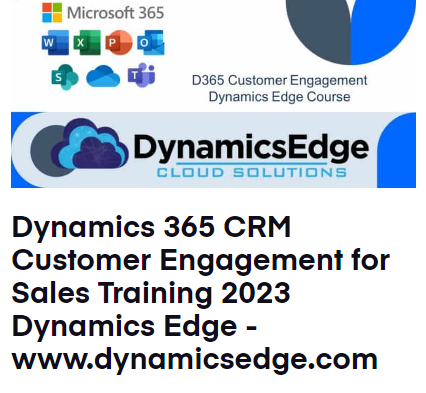Check out our Microsoft Dynamics 365 Customer Engagement CRM Training for more information on unlocking the secrets to leveraging Dynamics 365 CE CRM to revolutionize your organization.
D365 Customer Engagement includes D365 Sales and D365 Customer Service, and there is more to it. Customer Engagement is a broader concept that refers to the strategies and practices businesses use to create positive experiences and build strong relationships with their customers.
In the context of Dynamics 365, Customer Engagement includes applications like Sales, Customer Service, Marketing, and Field Service. These applications help businesses manage their customer interactions and support processes across different channels, enabling them to deliver personalized experiences and drive customer satisfaction.
“Is Dynamics 365 hard to learn?”
The difficulty of learning Dynamics 365 depends on your background and the specific applications you’re focusing on. For Customer Engagement, the Sales and Customer Service components are relatively easy to learn for those familiar with customer relationship management (CRM) systems. They are intuitive and designed for users with various skill levels. Comparatively, other D365 offerings like Finance and Operations or Business Central might require more specialized knowledge or experience in specific industries. Overall, Dynamics 365 offers comprehensive documentation, training resources, and a supportive community to help users learn and adapt to the platform. Dynamics Edge offers D365 training that caters to Sales, Customer Service, Project Service Automation, Project Operations, Marketing, Finance and Operations, Business Central, Power Platform and much more.
“How much does d365 training cost?”
Dynamics 365 pricing as well as the price of Dynamics 365 Training by Dynamics Edge varies depending on the applications, licensing, and deployment options you choose. For Customer Engagement, the Sales and Customer Service components are often bundled together in plans that start at around $50 to $95 per user per month (pricing may vary, inquire to Dynamics Edge for most recent info and pricing that is relevant to your scenario). For Dynamics 365 Training courses, with Dynamics Edge, the pricing depends on the course you want, how many people you want trained, and may depend on your specific situation Contact Dynamics Edge for more info.
Prices may vary for other D365 products like Finance and Operations or Business Central, depending on the complexity and functionality required. To get the most accurate pricing, it’s best to consult with Dynamics Edge for detailed pricing information based on your specific needs.
“How long does it take to learn Dynamics 365?”
The time it takes to learn Dynamics 365 depends on your background, familiarity with CRM systems, and the specific applications you’re focusing on.
For Customer Engagement, learning the Sales and Customer Service components could take a few weeks to a few months, depending on the complexity of your implementation and your previous experience. Other D365 offerings like Finance and Operations or Business Central might require more time, especially if you’re new to the field or industry. Leveraging available resources, such as Dynamics Edge’s Dynamics 365 Customer Engagement training courses, can help accelerate this learning process for you, so contact us to learn more or enroll in one of our courses now.
“Can I implement Dynamics 365 by myself?”
The answer to this question depends on the complexity of your requirements, your technical expertise, and the resources available to you. Implementing Dynamics 365 can be done with the help of Dynamics Edge, due to strong technical background and extensive experience in managing CRM systems. However, there are several factors to consider when determining if self-implementation is the right choice for you.
- Scope and complexity: The complexity of your Dynamics 365 implementation depends on the number of applications you need, the level of customization required, and the integrations with other systems. If your project has a limited scope and minimal customization, you might be able to implement it by yourself. However, larger and more complex implementations often require a team of professionals with specialized skills, in which case, you may want to leverage Dynamics Edge.
- Technical expertise: Implementing Dynamics 365 requires knowledge of the platform, its applications, and underlying technologies like Microsoft Azure. If you are familiar with these technologies and have prior experience with similar systems, self-implementation might be feasible. However, if you lack the necessary technical skills, you may want to collaborate with Dynamics Edge.
- Resources: Implementing Dynamics 365 can be time-consuming, especially if you are doing it alone. Balancing the implementation process with your regular job responsibilities might be challenging. If you have access to a dedicated team or can allocate sufficient time to the project, self-implementation becomes more manageable. Otherwise, Dynamics Edge may be a resource you may want to consider.
- Training and support: To successfully implement Dynamics 365, you need to be familiar with the platform’s features and functionalities. Dynamics Edge provides specialized training options which can help you learn and adapt to the platform. Even if you find it challenging to navigate these resources or need personalized guidance, working with Dynamics Edge on custom training courses or even a custom consulting with Dynamics Edge might be an even better option for you.
While implementing Dynamics 365 by yourself is possible, this may depend on your specific situation and needs. Assessing your technical skills, resources, and the complexity of the project will help you determine if self-implementation is the right approach or if collaborating with Dynamics Edge would be more beneficial.
Have a Question ?
Fill out this short form, one of our Experts will contact you soon.
Call Us Today For Your Free Consultation
Call Now
